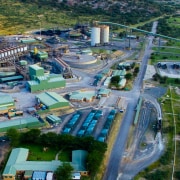|
Getting your Trinity Audio player ready...
|
By Thato Mahlangu
Image: Flickr/GovernmentZA
Pleas from some aggrieved mining-affected community members to the minister of the Department of Mineral Resources (DMR), Gwede Mantashe, are said to have fallen on deaf ears as nothing has been done to address their issues.
The department is also accused of withholding for over a year a report that looks into mining license corruption in its provincial offices.
Corruption Watch’s (CW) legal researcher Mashudu Masutha said the organisation’s corruption reporting channels are receiving numerous reports from different parts of the country. The reports, received in 2018, allege serious offences, including interference and opacity from officials who are responsible for awarding of mining rights, prospecting licenses and permits.
These allegations have been reported to the DMR’s director-general and the minister’s advisors but still, the ministry has not acted to address the issues, according to Masutha.
“The department has been asked on a number of occasions to make their corruption investigation reports public, especially for the Mpumalanga and Limpopo DMR branches, but that too hasn’t been attended to by the minister of DMR’s officials,” she said.
Klerksdorp DMR officials accused of being corrupt
There has been no joy for land owners of Vogelstruisnek Farm, North West, who are opposing a mining right granted to Mokotudi Mining (Pty) Ltd, which intended to use a part of their land for mining activities after Xstrata Mine’s term to mine had ended. Xstrata, which had good relations with the community, had acquired the mining rights before Mokotudi.
The Vogelstruisnek Farm community had organised themselves as a collective and registered a trust which they called the Kumamo Trust, hoping that it would administer all the affairs of the property and ensure that opportunities arising from the mining operations would benefit all land owners and the community.
But according to Masutha that didn’t happen with Xstrata’s successor. “The community didn’t benefit from the mining activities which were happening on their land.”
Furthermore, said Masutha, Mokotudi didn’t even consult with interested and affected parties as per section 10 of the Mineral and Petroleum Resources Development Act (MPRDA).
She said that when a mining license holder gets mining approval, they become obligated to ensure sustainability of people’s livelihoods. The company, therefore, would essentially be responsible for safeguarding the rights of those most affected by operations.
“The MPRDA recognises that these obligations run across the entire value chain of mining and therefore requires mining companies to uphold their obligations towards the communities even in transfer of the right to mine to another company, or if the company is restructuring. This ensures that the enforceable rights communities have towards the license holder are never lost and communities continue to exercise them the regardless of who is mining on their land.”
Department ‘aware’ of Vogelstruisnek tender irregularities
According to Masutha, the department had said it had been aware of the irregularities which existed when the Kumamo Trust’s objection was processed, but it still granted Mokotudi the prospecting right.
She said the decision of DMR’s Klerksdorp regional office to refuse to acknowledge the Kumamo application seemed unfair.
Ideally, the community was the preferred candidate to be granted the prospecting right application in terms of section 104 of the MPRDA but, added Masutha, Mokotudi had obtained the mining rights even though it had misrepresented itself and claimed to be a community-based.
What about the Northern Cape case?
We received reports of alleged corruption in the Northern Cape DMR regional office. Concerned reporters, who are said to be the land owners of Farm Richtersveld in Namaqualand, Northern Cape, accused the regional office of processing and granting a mining right in a corrupt manner.
According to Masutha, a company called Locitorque (Pty) Ltd had on 27 November 2015 applied for a prospecting right in terms of Section 16 of the MPRDA. But the application was rejected, with the department saying there was an existing right on the land for the same mineral and furthermore, the property sat within a national park.
“Although the property may have fallen within the Richtersveld National Park, it was not definitive that it constituted a national park in terms of the National Environmental Management: Protected Areas Act. The prohibition against mining was not absolute and the minister of mineral resources would determine whether or not mining was permitted. Accordingly, the DMR could not exercise that function and rely on that reason to reject Locitorque’s application,” Masutha argued.
She added that Locitorque had been working well with the community, having ensured that the community benefits from its mining activities before its right to extract diamonds on portion 11 of the farm expired in November 2009. But somehow the department had granted another company, Nabas, the mining rights even through the community had opposed the action twice through appeals with the Northern Cape DMR regional office and later a court action.
“Apparent shelving of the two appeals points to corruption and or maladministration in the application process,” Masutha said.
Masutha said the department should overturn its decision to give Nabas the mining rights and give the owners the opportunity to hear their case – but that would entail another court application.
“We also request the Northern Cape regional office to look into the above matter as a matter of urgency and to indicate whether Locitorque has been afforded a fair opportunity to both object to mining operations on their land and lodge an application as a previously disadvantaged community.”
More tender irregularities reported
Masutha said probes by the organisation’s Legal and Investigations team had exposed more corruption, this time involving the DMR’s Mpumalanga and Limpopo regional offices. This prompted further investigation into the matter.
She explained that the reports in both provinces, as in some others, detail instances of bribery, extortion, intimidation, threats to life and well-being, and overall gross abuse of power that has led to a systemic form of corruption taking place at these regional offices.
“Following these reports, CW launched a research project referred to as Mining for Sustainable Development in collaboration with Transparency International, which focuses on the corruption vulnerabilities in the awarding of licensing and permits. We identified 14 vulnerabilities and one of the key findings requiring urgent attention is the conduct of public officials in processing applications, particularly at the regional offices mentioned above,” Masutha said.
CW pressure yields two regional investigations
CW’s efforts in calling for the DMR to respond to these allegations has prompted investigations into both the Limpopo and Mpumalanga regional offices.
“We see this as a step in the right direction in effectively dealing with irregular mineral licenses and the historical backlog. However, equally important is to ensure that those findings are available for public scrutiny. Additionally, the corruption and abuse of power in the offices have far-reaching consequences and the office bearers who are complicit in improper conduct must be held to account,” Masutha said.
She said the DMR should urge the two regional offices to release the investigative report that details findings of corruption and irregularities in the application processes of mineral rights and permits.
“We also request that the details of the recommendations provided by the formal investigating unit be released, and that there should be an indication of which measures are currently put in place to curb corruption in mineral application processes. We also ask for an indication of whether the above measures are applied across all regional offices, and clarity on which accountability mechanisms were put in place regarding public officials which were found to be complicit in corrupt and/or irregular conduct at the DMR.”
Right of reply to implicated companies
According to Masutha, the organisation had tried on several occasions to get comment from these companies but that exercise has, so far, been unsuccessful.
“We have attempted to engage with the companies and all our requests to engage with them were denied. Some didn’t even respond.”
With companies and the department keeping silent, the communities remain in the same situation, Masutha said.
“This means there would still be limitations in trying to enforce their rights. But we have sent a PAIA request to try to get information through that process. If these companies and the government refuse to disclose information, it would mean the communities are failed yet again.”







